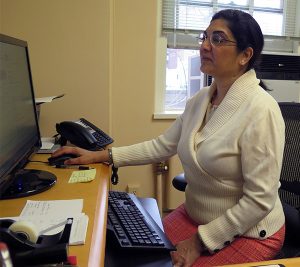Dr. Arti Pandya joined UNC Children’s as chief of genetics and metabolism in late Nov. 2014. The editors of CARE recently sat down with her to learn about her plans for the division and her research passion, the genetics of hearing loss.

Dr. Arti Pandya joined UNC Children’s as chief of genetics and metabolism in late Nov. 2014. The editors of CARE recently sat down with her to learn about her plans for the division and her research passion, the genetics of hearing loss.

How did you become interested in being a geneticist? What motivated your interest in hearing loss?
I was fortunate to do a combined pediatric genetic residency in Mumbai, India, which sparked my interest in the field, and I have not regretted the decision to pursue this further with training in the U.K. and U.S.
After joining VCU (Virginia Commonwealth University), I worked with Dr. Walter Nance and colleagues at Gallaudet University in Washington, D.C., on understanding the genetic/molecular etiology of hearing loss.
I find hearing loss to be an extremely intriguing and complex issue, where we have just scratched the surface so far in terms of our understanding the genetic basis. Compared to the small size of the organ of hearing, the processing of sound which enables hearing is far too complex and involves at least 1% of the genes in our genome. All these aspects as well as the high prevalence of hearing loss make it an important and interesting condition upon which to focus.
What is your vision for UNC’s Division of of Genetics and Metabolism? Do you have any plans for extended services or clinics?
The Division of Genetics and Metabolism is already engaged in providing excellent clinical care to the patients in our region. I envision the division providing genetic and metabolic services to all in need across the state, and even nationally, due to the expertise held by members of the division.
We are entering an era of genomics and personalized medicine, where genetics now crosses all specialties in pediatric and adult medicine. I envision that with cutting edge medical expertise, members of the division will be a resource to our families and help them translate the latest discoveries in our field to improve health. We are expanding the team with additional faculty members and counselors to meet these needs.
In the near future, I look forward to setting up telemedicine services, whereby we could extend genetic services and counseling to the remote areas of North Carolina. I also would like to establish research collaborations with members in adult genetics and otolaryngology.
In your published research, we noticed an interest in the ethical impact of new discoveries in genetic hearing loss on deaf persons and their families. That’s very intriguing; could you explain that a little further?
When I began working in this field, I, like many others, viewed hearing loss with a medical lens, considering it a disorder. However, my interactions with individuals with hearing loss, especially at Gallaudet University, made me realize that ours was an extremely narrow view and that there is a community identified as “Deaf” due to a common language. This was the impetus of me delving deeper to understand their attitudes and the impact that discoveries in the genetics of hearing loss has on the Deaf community at large.
Finally, do you have any memorable cases that have perhaps affected your outlook on patient care or motivated your devotion to medicine?
There are too many cases to talk about individually, but there are a few instances that are etched in my mind. For example, telling the parents of a bright 5 year old that their son had a form of storage disorder when they had initially come in for evaluation of short stature. Or informing the parents of a particular patient that their child had hearing loss due to a common genetic mutation and seeing relief on the parents’ face, because they wouldn’t have to worry about other associated features [of a rare genetic disease].
I learn from every patient I care for, and each one leaves me with a desire to help the parents navigate their journeys being empowered with knowledge. I have seen the struggles parents undergo to accept difficult diagnoses but also the determination with which they advocate for their children.
I have known families who are angry to be on the receiving end of bad news, but they also view you as an expert and turn to you for advice. The trust families place in you makes you aware of your responsibility to the family—and to society as a whole—in staying true to your profession.
More About Dr. Pandya
Arti Pandya, MD, MBA, attended medical school and completed her residency in pediatric genetics at the King Edward Memorial Hospital in Mumbai, India. She did a fellowship in clinical genetics at the Children’s Hospital of Los Angeles, California, and then completed a two-year pediatric residency at the St. Louis Children’s Hospital in Missouri.
Dr. Pandya did a year of postdoctoral research in basic immunology before joining the faculty of the Medical College of Virginia at Virginia Commonwealth University, where she spent 23 years in the Department of Human Genetics practicing clinical genetics, teaching, and researching the genetics of hearing loss.
She joined the faculty of the University of North Carolina School of Medicine in November 2015 as chief of the Division of Genetics and Metabolism in the Department of Pediatrics. Of coming to UNC, she says, “Having progressed very well in my career at VCU, the opportunity to join UNC’s Division of Pediatric Genetics and Metabolism was attractive, as it would enable me to make a broader impact. The team at UNC is strong in clinical practice and research, and the opportunity to collaborate with such an outstanding group of researchers and colleagues would have been impossible to turn down.”